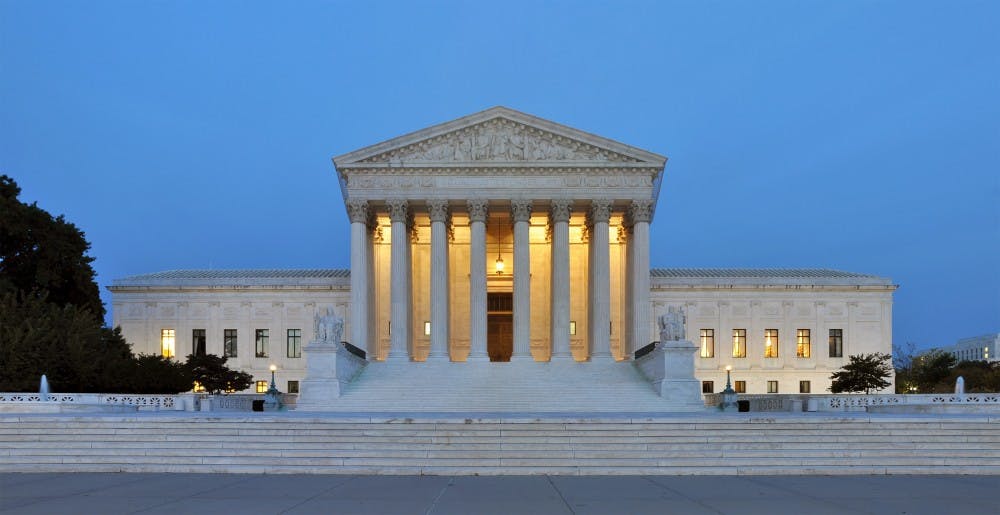With the recent passing of American icon and Supreme Court Justice Ruth Bader Ginsburg, the upcoming Presidential election has taken on a new intensity, as both political parties gear up for a confirmation battle in the Senate, and millions of voters decide whether the Supreme Court’s leaning is a ballot-box issue.
Many see the upcoming fight as one where Senate Majority Leader Mitch McConnell is siding with President Donald Trump, violating his own precedent of not confirming Supreme Court nominees in an election year. In reality, McConnell’s actions function more as an insurance policy to retain a conservative influence on the Supreme Court without needing the politically troubled President to win reelection.
Despite her long and storied career, Justice Ginsburg’s passing was immediately — and somewhat callously — evaluated in terms of the political mudslinging that would soon ensue. With the release of her dying wish to be replaced by the next president, Trump was faced with a decision. On the one hand, he could rush to fill her seat, mocking the precedent set by the Senate majority in 2016 and potentially sparking an arduous confirmation battle. On the other, he could wait, making the case to religious voters and defecting moderates that the only way they could ensure another conservative on the Supreme Court would be to turn out in droves to support him on Nov. 3.
By pursuing the former, he would conform to his brazen, often hypocritical brand of politics; the latter would be the calculated move of someone confident in his chances of reelection.
After choosing to nominate, the President and the Senate majority have been met with fierce criticism, as many recall the same majority’s vehement opposition to President Barack Obama’s judicial appointee to replace the late Justice Antonin Scalia in 2016. Charges of hypocrisy have been largely ignored by McConnell, leading many to believe that he is blindly following President Trump’s directives in spite of his professional obligation to honor the precedent he and his colleagues set years ago.
The Kentucky Republican, however, is playing a much longer game than just pleasing the President. In fact, he isn’t making a risky gamble at all — he’s hedging his bets. If McConnell can push through the now-named Amy Coney Barrett as the nominee, he can guarantee a right-leaning bent on the Supreme Court for a generation to religious and judiciary-focused conservatives.
Doing so will give those same voters, who have recently been reconsidering their support for the often divisive and hardly religious President Trump, a chance to quietly get what they came for and go. Their views will be carried out by the Supreme Court, and they will not need to support the President in his reelection bid. If the President should fail in his reelection bid and Joe Biden were to replace him, Mitch McConnell will be able to return to policymaking as normal with the Supreme Court victory in his back pocket; he will not have to deal with the demands of what has been an idiosyncratic and disorganized Trump administration.
If he had waited, McConnell would have had to bet that Donald Trump will win in what is already a closely watched and likely closely contested election. A then-unfilled seat would only have a nominee after the confirmation of another four years of the President’s divisive rhetoric and destructive actions. Far from hypocrisy, Mitch McConnell remains remarkably consistent in taking any steps necessary to influence policy in the favor of conservatives.

These events will be particularly relevant to the Princeton community, as the University has ramped up its commitment to civic participation. Through a host of on-campus groups under the Vote100 Initiative, the program attempts to achieve 100 percent participation among eligible voters in the Princeton student body. The coming confirmation battle and its implications for the election will inevitably send shockwaves through the election-focused campus community as we get closer to casting ballots.
What should now be clear for conservative voters heading to the polls is this: Mitch McConnell is not supporting the President — he’s selling him out. Plenty of conservative friends and classmates, especially those of the Christian faith, were motivated to vote for Donald Trump in the past because of prospective judicial appointments despite his problematic, insulting, and unethical rhetoric and deeds. With this latest nominee, their views on reproductive rights, Congressional redistricting, Obamacare, and other issues coming before the Court will be overwhelmingly represented for decades, regardless of how they vote in the general election. With a Supreme Court already in their favor, they should no longer feel forced to qualify the President’s own conduct with his potential for advancing conservative jurisprudence. Examining the former can and should direct their conscience when casting their vote in November.
Justice Ginsburg was confirmed by a vote of 96–3. Her close friend and colleague, Justice Scalia, by 98–0. The vote to confirm Judge Barrett, successor to Ginsburg and former clerk to Scalia, will likely be a staggeringly more divided one. But regardless of how the Senate votes, Mitch McConnell will have bought his insurance against a lagging incumbent for whom his Christian conservative constituents will now have a much easier time voting against.
Dillion Gallagher is a sophomore hoping to concentrate in the Princeton School of Public and International Affairs. He can be reached at dilliong@princeton.edu.









